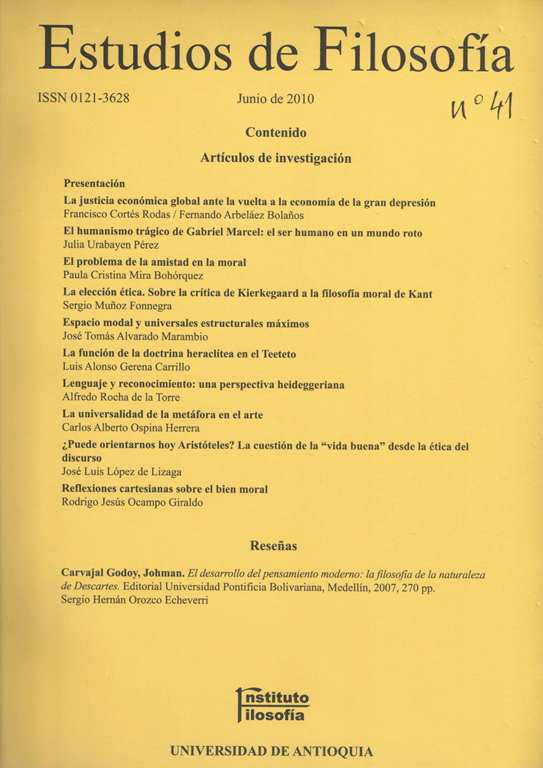Modal space and maximal structural universals
DOI:
https://doi.org/10.17533/udea.ef.11606Keywords:
modality, possible worlds, actualism, universals, individual essencesAbstract
This work considers the validity of the theory of possible worlds as maximal structural universals in relation with the known criticisms against actualist views on possible worlds. In a first part the modal conception based on universals is summarily exposed. Then, the different dif culties are presented. Two of those appear especially relevant for the modal theory defended here: (i) the confusion of different indiscernible possibilities, and (ii) the explanation of the nature of the representation of possibilities. After the examination of these difficulties, it is shown how the modal theory based on universals can answer both problems.
Downloads
References
ADAMS, R. M. (1999) “Primitive Thisness and Primitive Identity”, en J. Kim y E. Sosa (eds.), Metaphysics. An Anthology. Blackwell, Oxford, 172-183.
ALVARADO, J. T. (2007) “Mundos posibles como universales estructurales máximos. Una conjetura ontológica” Análisis losófico, 27 (2), 119-143.
ALVARADO, J. T. (2008), “Teorías modales lingüísticas refinadas” Pensamiento, 64 (240), 315-343.
ALVARADO, J. T. (por aparecer) “Universales estructurales”.
ARMSTRONG, D. M. (1978) Universals and Scientific Realism, Volume I, Nominalism and Realism. Cambridge University Press, Cambridge.
ARMSTRONG, D. M. (1989) Universals. An Opinionated Introduction. Westview, Boulder.
ARMSTRONG, D. M. (1997) A World of States of Affairs. Cambridge University Press, Cambridge.
ARMSTRONG, D. M. (2004) “How Do Particulars Stand to Universals?”, en: Zimmerman, D. W. (ed.), Oxford Studies in Metaphysics, Volume 1. Clarendon Press, Oxford, 139-154. DOI: https://doi.org/10.1093/oso/9780199267729.003.0006
DIVERS, J. (2002) Possible Worlds. Routledge, London.
KrIPKE, S. (1980) Naming and Necessity. Blackwell, Oxford.
LEWIS, D. (1973) Counterfactuals. Blackwell, Oxford.
LEWIS, D. (1986) On the Plurality of Worlds. Blackwell, Oxford.
LEWIS D. y R. Langton, (1999) “De ning ‘Intrinsic’”, en: Lewis, D. Papers in Metaphysics and Epistemology. Cambridge University Press, Cambridge, 116-132.
MELIA, J. (2001) “Reducing Possibilities to Language” Analysis 61, 19-29. DOI: https://doi.org/10.1093/analys/61.1.19
MELIA, J. (2003) Modality. Acumen, Chesham. DOI: https://doi.org/10.1017/UPO9781844653348
PLANTINGA, A. (1974) The Nature of Necessity. Clarendon Press, Oxford.
PLANTINGA, A. (2003) “World and Essence”, en: Essays in the Metaphysics of Modality. Oxford University Press, Oxford, 46-71. DOI: https://doi.org/10.1093/0195103769.003.0003
TORRETTI, R. (1998) El paraíso de Cantor. La tradición conjuntista en la filosofía matemática. Editorial Universitaria, Santiago.
van INWAGEN, P. (2001) “Two Concepts of Possible Worlds”, en: Ontology, Identity and Modality. Essays in Metaphysics. Cambridge University Press, Cambridge, 206-242.
WIGGINS, D. (2001) Sameness and Substance Renewed. Cambridge University Press, Cambridge. DOI: https://doi.org/10.1017/CBO9780511612756
Downloads
Published
How to Cite
Issue
Section
Categories
License
Copyright (c) 2010 José Tomás Alvarado Marambio

This work is licensed under a Creative Commons Attribution-NonCommercial-ShareAlike 4.0 International License.
Authors who publish with this journal agree to the following terms:
1. The Author retains copyright in the Work, where the term "Work" shall include all digital objects that may result in subsequent electronic publication or distribution.
2. Upon acceptance of the Work, the author shall grant to the Publisher the right of first publication of the Work.
3. The Author shall grant to the Publisher a nonexclusive perpetual right and license to publish, archive, and make accessible the Work in whole or in part in all forms of media now or hereafter known under a Creative Commons Attribution-NoCommercia-ShareAlike (CC BY-NC-SA 4.0), or its equivalent, which, for the avoidance of doubt, allows others to copy, distribute, and transmit the Work under the following conditions: (a) Attribution: Other users must attribute the Work in the manner specified by the author as indicated on the journal Web site;(b) Noncommercial: Other users (including Publisher) may not use this Work for commercial purposes;
4. The Author is able to enter into separate, additional contractual arrangements for the nonexclusive distribution of the journal's published version of the Work (e.g., post it to an institutional repository or publish it in a book), as long as there is provided in the document an acknowledgement of its initial publication in this journal;
5. Authors are permitted, and Estudios de Filosofía promotes, to post online the preprint manuscript of the Work in institutional repositories or on their Websites prior to and during the submission process, as it can lead to productive exchanges, as well as earlier and greater citation of published work (see The Effect of Open Access). Any such posting made before acceptance and publication of the Work is expected be updated upon publication to include a reference to the Estudios de Filosofía's assigned URL to the Article and its final published version in Estudios de Filosofía.















